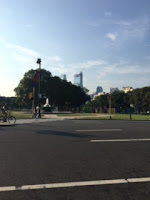When it comes to routine, I am the best. I absolutely love getting into a daily groove and staying there for a long time. I also love going to the same restaurants on multiple occasions and watching my favorite movies and shows many times over. (Most recent case in point: I have watched the entire available-in-America catalog of The Great British Baking Show more times than I can count. I was on round five last time I checked and that was a while ago.)* There's something delightful about establishing a routine or revisiting something familiar. You know exactly what you'll get and you can look forward to enjoying it.
By best, I also mean worst. Not just because most people find this approach to life terribly dull for lacking in spontaneity. I see the value in changes and I do like to mix it up on occasion. (Mostly when a friend asks that we eat at not-the-same-restaurant-we-always-go-to.) I mean that sometimes routine can be detrimental to a research program.
Fully immersing ourselves in a research project has plenty of advantages, as does regular/daily writing and setting a model of consistency for mentees. These practices can produce both more efficient and higher-quality work than repeatedly re-orienting to a project whenever opportunity arises. But even this can be taken too far. In my case, I get so engrossed that I don't leave my building for eight or nine hours at a time during winter and summer breaks. I get lots of work done, but my efficiency decreases after several days (or weeks) in a row of this approach.
To combat my tendency to retread a very deep path, I've embraced two practices:
(1) The writing retreat, and
(2) The collaborative research trip.
I've tweeted about the writing retreats I organize for our faculty writing group at my university (see below),** and others have written (very eloquently) about the benefits and how-tos of these events. There's something about a change of scenery for the purpose of writing that packs a punch. Faculty offices are associated with plenty of other kinds of work, and it's easy to get distracted or restless. Finding a peaceful location where the goal is to write gives us something extra to look forward to and the perfect justification for putting other work on hold.
Hoppy Tuesday! This makes up for road closures/coffee disasters that it took to get here. My work space for the next 2 days. #Acwri #ECRChat pic.twitter.com/a77qXq0Weu— Dr. Dani Arigo (@DaniArigo) June 20, 2017
 |
| Running on the BFP. |
 |
| Office space for Philly visit. |
This is your life moment of the week: Busting out of a routine helps to establish balance. Looking forward to getting back to my usual, but also to my next break from it :)
*I'm a member of my local public broadcasting affiliate, obviously, so I've even binge-watched all of season 4 many times.
**Please ignore the typo in this one - Twitter really needs an EDIT button!



